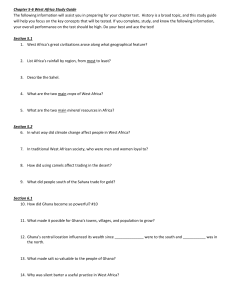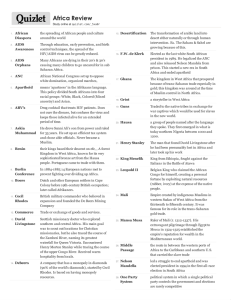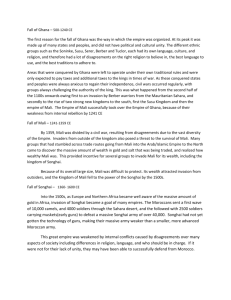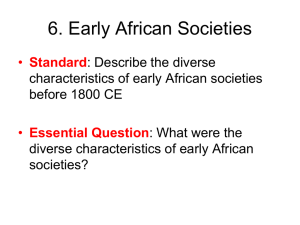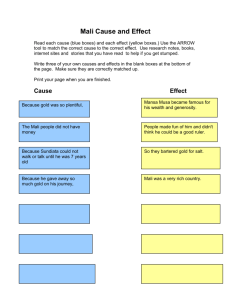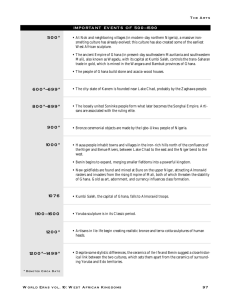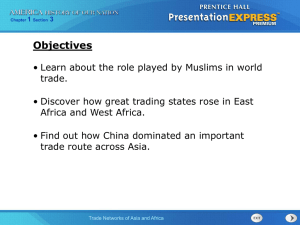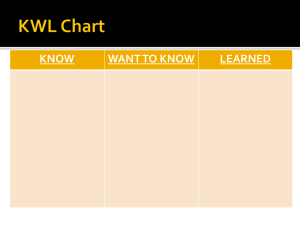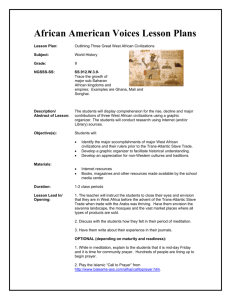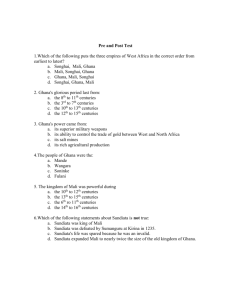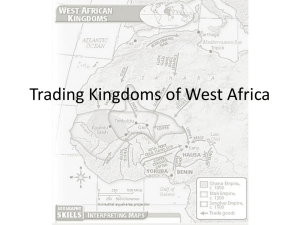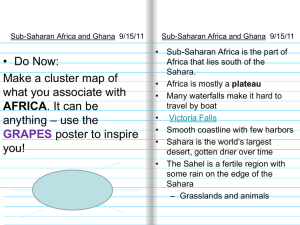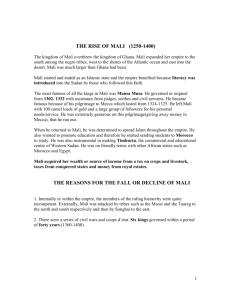here.
advertisement
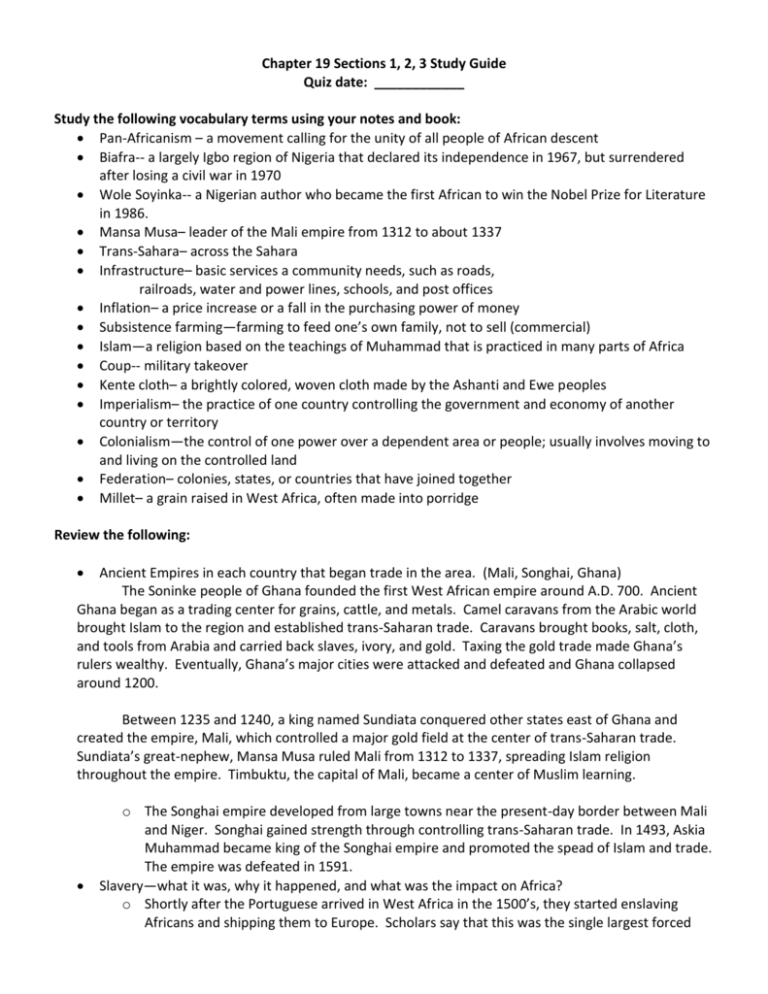
Chapter 19 Sections 1, 2, 3 Study Guide Quiz date: ____________ Study the following vocabulary terms using your notes and book: Pan-Africanism – a movement calling for the unity of all people of African descent Biafra-- a largely Igbo region of Nigeria that declared its independence in 1967, but surrendered after losing a civil war in 1970 Wole Soyinka-- a Nigerian author who became the first African to win the Nobel Prize for Literature in 1986. Mansa Musa– leader of the Mali empire from 1312 to about 1337 Trans-Sahara– across the Sahara Infrastructure– basic services a community needs, such as roads, railroads, water and power lines, schools, and post offices Inflation– a price increase or a fall in the purchasing power of money Subsistence farming—farming to feed one’s own family, not to sell (commercial) Islam—a religion based on the teachings of Muhammad that is practiced in many parts of Africa Coup-- military takeover Kente cloth– a brightly colored, woven cloth made by the Ashanti and Ewe peoples Imperialism– the practice of one country controlling the government and economy of another country or territory Colonialism—the control of one power over a dependent area or people; usually involves moving to and living on the controlled land Federation– colonies, states, or countries that have joined together Millet– a grain raised in West Africa, often made into porridge Review the following: Ancient Empires in each country that began trade in the area. (Mali, Songhai, Ghana) The Soninke people of Ghana founded the first West African empire around A.D. 700. Ancient Ghana began as a trading center for grains, cattle, and metals. Camel caravans from the Arabic world brought Islam to the region and established trans-Saharan trade. Caravans brought books, salt, cloth, and tools from Arabia and carried back slaves, ivory, and gold. Taxing the gold trade made Ghana’s rulers wealthy. Eventually, Ghana’s major cities were attacked and defeated and Ghana collapsed around 1200. Between 1235 and 1240, a king named Sundiata conquered other states east of Ghana and created the empire, Mali, which controlled a major gold field at the center of trans-Saharan trade. Sundiata’s great-nephew, Mansa Musa ruled Mali from 1312 to 1337, spreading Islam religion throughout the empire. Timbuktu, the capital of Mali, became a center of Muslim learning. o The Songhai empire developed from large towns near the present-day border between Mali and Niger. Songhai gained strength through controlling trans-Saharan trade. In 1493, Askia Muhammad became king of the Songhai empire and promoted the spead of Islam and trade. The empire was defeated in 1591. Slavery—what it was, why it happened, and what was the impact on Africa? o Shortly after the Portuguese arrived in West Africa in the 1500’s, they started enslaving Africans and shipping them to Europe. Scholars say that this was the single largest forced movement of people in history. African merchants and rulers sold enslaved Africans to Europeans who sent the slaves to the Americas. The slave trade devastated Africa. Between the late 1400’s and the middle 1800’s, 10 to 12 million enslaved persons came to the Americas. This emptied towns and villages and destroyed patterns of culture, work, and trade. Natural resources that are primary areas of wealth for West African countries. o Mining and oil in Nigeria; cocoa in Ghana; gold in Mali; cocoa, coffee, palm oil in Cote D’Ivoire The impact of drought on the people of Africa. o Draught typically causes famine because they do not have a way to survive when their crops and livestock fail. Colonial borders and the impact they had on native African people. o Even after the slave trade ended, Europeans continued to raid Africa for cheap labor, natural resources, and markets. European imperialism, or control of weaker nations, grew in the late 19th century as industrialism grew in Europe. Railroads, steamships, and the repeating rifle helped Europeans control much of Africa. In the 1880’s, European powers changed the boundaries in Africa, ignoring traditional ethnic boundaries and sometimes grouping enemies together in the same colony. The causes of unstable governments after independence in Africa. o In the early 1900’s, African students who studied overseas began to dream of independence for their own people. They began a movement called Pan-Africanism which called for unity and freedom for all people of African descent. Since Britain maintained indirect rule over its colonies, those people were better equipped to self-rule. Nations with more tight rule struggled with their new independence. Economic advantages and disadvantages in Mali and Cote d’Ivoire. o Mali has no coast, so it relies on roads and ports leading to neighboring countries to support its economy. Most Malians are livestock herders, fishers, or subsistence farmers. However, less than four percent of Mali’s land is fertile, or able to grow crops. The inland delta of the Niger River is an important source of fish. Farmers grow millet, rice, and sorghum for their families, or export cotton, peanuts, or sugar cane. The infrastructure of Mali largely undeveloped which means there are few roads, schools, or factories. Only ten percent of Mali’s roads are paved. Gold is the most important mineral export in Mali. o Two out of three Ivoirians are farmers, and the country is one of the world’s biggest exporters of coffee, cocoa, and palm oil. Since the economy relies on few products, the economy shifts with world wide price changes. Continuing warfare threatens profits too. The country has a well-developed infrastructure with 4,000 miles of paved roads, cell phone access, and some Internet availability. There are also offshore oil reserves. You should read each section or go online and listen to each section in the textbook (pages 581-600.) The questions at the end of each section are helpful for review.

